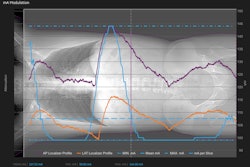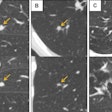Bayer has confirmed it will no longer be participating in the radiology AI software platform sector, opting to discontinue its Calantic Digital Solutions AI platform as well as services provided by its U.K.-headquartered Blackford Analysis subsidiary.
The move marks the end of the contrast media firm’s five-year initiative to provide a radiology AI platform aimed at enabling radiologists to more easily implement AI applications from a variety of software developers into their workflow.
“After careful evaluation of market insights, technical considerations, and customer needs, Bayer has made the decision to deprioritize its digital platform business, which includes Blackford, and will discontinue offerings and services,” the company said in a statement. “Resources will be reinvested into growth areas that support healthcare institutions around the world, in alignment with customer needs.”
Bayer initially partnered with Blackford, a 2010 spin-out from Edinburgh University in Scotland, in a licensing and development deal in 2020. A longtime radiology AI platform developer, Blackford provided the infrastructure and imaging and analytics clinical application ecosystem to serve as the foundation for Calantic, which was introduced in June 2022.
Bayer then acquired Blackford in 2023. Since then, Blackford has been operating as an independent subsidiary, continuing to offer its Blackford Platform and adding new partnerships with AI software developers such as DeepTek in 2024. Also last year, Blackford signed on with GE HealthCare to integrate Blackford Platform within GEHC’s TruePACS and Centricity product lines.
Today, Blackford has over 150 third-party AI applications available on its platform from over 60 AI software developers, encompassing body, breast, cardiology, musculoskeletal, neurology, operational, pediatric, and thoracic service lines, according to its website.
The next steps
In addition to shutting down the Calantic AI platform, Bayer will also be discontinuing Blackford services and offerings.
“As part of this transition, we are committed to managing our obligations to customers, partners, and employees,” the Bayer spokesperson said. “A dedicated core team will remain in place to support the Blackford AI platform during this transition and support customers in a dedicated approach through the transition.”
Existing contractual agreements will be fulfilled, according to Bayer.
Bayer's decision to end its involvement in the radiology AI platform business was initially reported by radiology recruiter Jay Gurney in a LinkedIn post. In his post, Gurney speculated that Blackford is now up for sale.
In keeping with its policy to not comment on future decisions, Bayer declined to discuss the prospect of a sale.
“At this time, our focus is on managing the transition effectively, including the priority of managing all obligations to customers, partners, and employees during this period,” the Bayer spokesperson said.
Bayer also noted that its “commitment to innovation in the digital space remains strong, and we will continue to engage with our customers and partners to drive advancements in clinical imaging and AI technologies.”
Triggering a consolidation wave?
Market analyst Umar Ahmed of Signify Research told AuntMinnieEurope on 8 September that the announcement underscores some of the structural challenges in radiology AI that have been building for years.
“Adoption has been slower than expected, reimbursement remains narrow in scope, and IT integration is a hurdle for many hospitals,” Ahmed said. “Investors have noticed, and venture capital flowing into this sector has been declining for several cycles now as ‘the money’ moves to agentic/generative AI in unregulated use cases (e.g., automation in back-office, workflow, etc.).”
It could also trigger a broader consolidation wave.
"We currently track around 30 AI platform providers globally, and with Blackford and Calantic effectively removed from the board, nearly 10% of the current spend on the entire AI radiology platform ecosystem disappeared overnight,” he continued. “That kind of disruption shakes confidence, both for investors and for hospital buyers who thought platforms was the optimal way to procure AI.”
Beginning of the end?
Bayer’s exit may well be the beginning of the end for the radiology AI platform model in its current format, according to Ahmed.
“Platforms promised hospitals simplicity in scaling access to AI tools, but in doing so also have added a layer of cost and complexity,” he said. “Vendors thought platforms would shield them from slow adoption, but instead they ended up competing for limited attention inside crowded ecosystems. Bayer’s retreat could be the moment when the industry admits the platform ‘dream’, at least in its current form, overlooked the fundamentals of new technology adoption in healthcare – it's typically slow, hard, and expensive to do successfully.”
Adoption could be slowed further in the near term because risk-averse buyers may wait to see who will survive the shakeout before making any long-term commitments. There will also be a ripple effect across the entire ecosystem, Ahmed added.
“Radiologists, hospital executives, and even patients start to question whether AI is truly ready for prime time,” he said. “That reputational drag may be the biggest casualty of all, and it will take bold, credible results from surviving vendors to restore confidence.”
The current business model doesn't really work because massive usage is required to justify the 30% platform fee, noted another analyst. Aidoc is in good shape, and Blackford probably will survive too as original equipment manufacturers (OEMs) like Philips and GE Healthcare ramp up their efforts, but others like DeepC and CARPL.ai are facing difficulties, the source pointed out.
"The lesson? Independent AI platforms may not survive on their own," stated another observer. "They'll be swallowed up by OEMs with scale, pipelines, and hardware to bundle them into."




















